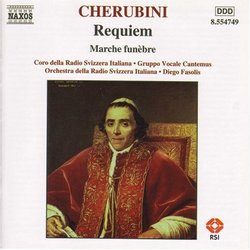| All Artists: Luigi Cherubini, Diego Fasolis, Orchestra della Svizzera Italiana Title: Cherubini: Requiem & Marche funèbre Members Wishing: 0 Total Copies: 0 Label: Naxos Release Date: 9/26/2000 Genre: Classical Styles: Opera & Classical Vocal, Chamber Music, Historical Periods, Classical (c.1770-1830), Early Music Number of Discs: 1 SwapaCD Credits: 1 UPC: 636943474921 |
Search - Luigi Cherubini, Diego Fasolis, Orchestra della Svizzera Italiana :: Cherubini: Requiem & Marche funèbre
 | Luigi Cherubini, Diego Fasolis, Orchestra della Svizzera Italiana Cherubini: Requiem & Marche funèbre Genre: Classical
|
Larger Image |
CD DetailsSimilar CDs
|
CD ReviewsIntensely moving tertius3 | MI United States | 06/12/2001 (5 out of 5 stars) "In 1816 Cherubini composed magnificent funeral music to commemorate the earlier communist regicide of Louis XVI and the end of the first world war instigated by Napoleon. It is appropriately slow and solemn, played and sung with heart by Swiss-Italian musical groups. It is an entirely choral and orchestral work, without soloists in the tender parts, perhaps as a way of universalizing the suffering and fervid hope expressed in the requiem text, as in the collective relief of an exhausted Europe and above all France of the time. The brass in the Dies Irae presage the swirling brass bands of Berlioz's stupendous Requiem composed a few decades later for still another war. The music, singing, performance, and resonant sound were all much better than I expected. The CD is simply an unbeatable bargain for those who would like to try this music. While there is a slightly better conducted performance available, no one has surpassed the heartfelt devotion of the singing here. Played at a decent volume on good speakers, this is a dramatically dynamic work one might not expect from the by-then conservative Cherubini and other lesser lights of the late Classical world (a world already shredded by the Terror and Napoleon). If you read French as well as English or Spanish you are in luck, because you get two different sets of printed commentary on this rare piece. No explanation for the unusual presence of Chinese gongs in both pieces is given. I believe the orchestra plays on modern instruments." Ten Years Older than Beethoven ... Giordano Bruno | Wherever I am, I am. | 05/27/2010 (5 out of 5 stars) "... Cherubini was arguably the most acclaimed composer across Europe in the first half of the 19th Century. Beethoven himself regarded Cherubini as his "greatest contemporary. Being an Early Music specialist myself, I've blithely ignored Luigi Cherubini (1760-1842) until recently as an example of 'Too Late Music'. My ears were opened upon hearing a live performance of this Requiem in C minor, composed in 1816. This is music of the utmost intensity and emotional authenticity, both grand and simple simultaneously, written for chorus without soloists and orchestra. To suggest that Cherubini was already "conservative" at the time, as another reviewer has, is blatantly absurd; the composition is bold in its sweeping unity and its sparse counterpoint. It points straight into the future, past Berlioz, toward Brahms and plausibly toward Mahler. Berlioz, by the way, was another composer who revered Cherubini. Cherubini was commissioned to write the Requiem by the restored royalist government of post-Napoleonic France, as a memorial for King Louis XVI, executed for the crimes of the 'Ancien Regime' in 1792. Cherubini wrote a second Requiem in 1836, scored for only men's voices and orchestra, intended for and performed at his own obsequies. I can't proclaim that this performance of the first Requiem is the best available; frankly, it's the only one I've heard on CD. I picked it over several others merely on the basis of the 29-second samples. Ignorance may be bliss, of course, but I am impressed by the disciplined resonance of the Coro della Radio Svizzera Italiana. Conductor Diego Fasolis is familiar.... "one of us", strongly influenced by the aesthetics of "historically informed performance." Cherubini's powerfully tragic opera Medea is available on DVD, with the title role sung by Antonacci. I've reviewed that performance already. Next in line? His string quartets! I'd be thrilled to get recommendations of performances of them from Cherubini lovers all and sundry." La musique majestueuse, Cher Maitre Cherubini John A. Di Battista | Montreal, Quebec, Canada | 01/24/2008 (5 out of 5 stars) "I have used the term 'maitre'(master) because Cherubini, though an Italian, spent most of his professional life in France. Also, I reserve the term for a select group of composers whom I believe influenced the ultimate development of European music. I speak of the first master, Pierluigi da Palestrina, Bach, Vivaldi, van Beethoven, and Cherubini (who?). It should be mentioned that what follows is biased since the latter is my preferred composer. What ever style he chose to compose in, the music is majestic in orchestration, innovation, form, depth, texture, feeling, and melodic beauty. The requiem is no exception, he is the consummate master. He was obviously an extremely hardworking and serious composer. Unfortunately, he did not have the good sense to ingratiate himself with the Emperor Buonaparte (another Italian who spent his life in France). Bravo encore une fois mon cher maitre Cherubini."
|

 Track Listings (8) - Disc #1
Track Listings (8) - Disc #1
